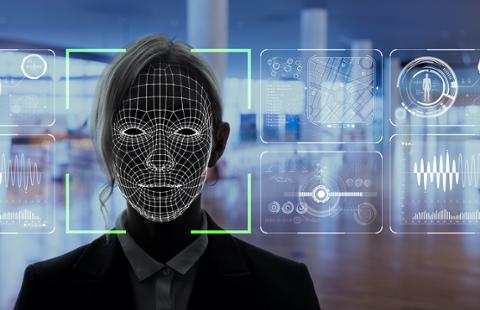Part 10 in the AI and Your Tech Career Series
Welcome to Part 10 of "AI and Your Tech Career," Dice's 10-part article series walking through the basics of how to successfully integrate artificial intelligence and machine learning skills into your tech career journey. We'll cover everything from the most popular jobs and skills, to non-technical roles in AI, industry applications and more. You can build your dream tech career, and AI can help!
In 2024, artificial intelligence (AI) and machine learning (ML) are no longer futuristic concepts. They're woven into the fabric of our daily lives, from the way we shop, to how we communicate, to how we interact with nearly every facet of technology. This rapid integration has sparked a legitimate concern among tech professionals: are our jobs at risk?
The short answer? Breathe easy. While AI will undoubtedly transform how we work (and is already doing so in some ways), it's not a harbinger of mass unemployment in the tech sector. In fact, AI presents a tremendous opportunity for growth, provided we approach it with the same adaptability and strategic thinking that have always made tech professionals successful.
Here's the key takeaway: AI isn't here to replace us, it's here to augment us. In other words, it's time to embrace AI upskilling for tech professionals. The most powerful use case for these tools thus far is in empowering us to do not just more, but to think bigger and better. To be more. Let's explore how you, as a tech professional, can adapt to AI in tech and thrive in this exciting new era.
Sharpening Your Skills: A Continuous Learning Mindset
Technology is a constant state of flux, and AI/ML are no exception. To stay ahead of the curve, prioritize continuous learning. Here's how:
- Identify the Right Skills: Don't fall victim to the "latest and greatest" trap. Focus on skills that complement AI, not compete with it. This could include expertise in data analysis, cloud computing, or cybersecurity. Research the specific needs of your field and target skills that will enhance your ability to work alongside AI systems.
- Embrace Upskilling: Learning new things should be a regular part of your professional development. Online courses, workshops, and even certifications are all learning resources for AI and tech that can equip you with the specialized knowledge to thrive in this evolving landscape. With hard work, you'll develop a future-proof skillset as you're upskilling for AI jobs.
- Become a Lifelong Learner: Cultivate a genuine curiosity about emerging technologies. Read industry publications, attend conferences, and network with other professionals. The more you learn, the better equipped you'll be to adapt and contribute in meaningful ways.
Remember, AI excels at handling large datasets and automating repetitive tasks. Your human strengths lie in creativity, strategic thinking, and problem-solving – abilities that AI still struggles to replicate.
Beyond the Buzzwords: Choosing the Right Company Culture
Job hunting in the age of AI requires a shift in perspective. You need to learn about individual company culture for AI adoption in order to find the right AI job fit. Don't get dazzled by flashy brands or a long list of perks. Dig deeper and ask yourself:
- How is the company using AI? Are they using it strategically to augment human talent, or are they seeking wholesale automation at the expense of skilled employees? It makes no sense to try and avoid automation in tech careers, but make sure that companies have effectively integrated automation into their current workflows.
- What is the company culture like? Does it encourage innovation, collaboration, and adaptation? Are there opportunities for professional development alongside AI initiatives?
- What projects will you be working on? Will your role allow you to leverage your human skills alongside AI tools, or will you be stuck in a monotonous, easily automated position?
By prioritizing these aspects, you'll find a company that values your human capabilities and actively promotes growth alongside AI integration.
How Dice Can Help
The rise of AI shouldn't be met with fear, but with a sense of possibility. By strategically developing your skillset, focusing on what makes you uniquely human, and choosing the right work environment, you can position yourself for success in this new era. Remember, AI is a powerful tool, and just like any tool, it's most effective when wielded by skilled professionals. Embrace lifelong learning, prioritize human-centric work cultures, and you'll ensure your career continues to flourish in the fascinating world of AI and beyond.
When it comes to building the tech career that’s right for you, Dice is here to help you every step of the way. Whether it’s knowledge, jobs, career tools, access to recruiters and hiring managers, or a combination of all of the above, we can’t wait to be your partner in bringing even your most aspirational career dreams closer to reality.
For more information on Dice and how to get started:
- Check out our AI Careers and Resource Center, our hub for AI-focused content for tech professionals
- Learn more about Dice here
- How to create your Dice profile
- Search for AI and other tech jobs
We hope you enjoyed Part 10 of our AI and Your Tech Career Series! To read the full series and take command of your career in AI, view them on the links below.
Part 1: Unveiling AI Career Opportunities: Key Roles and Emerging Hybrid Jobs in Artificial Intelligence
Part 3: AI Jobs Demand Analysis: Current Trends and Future Outlook in Artificial Intelligence Careers
Part 4: Transitioning into AI: Adding Artificial Intelligence and Machine Learning Skills to Your Repertoire
Part 5: Charting AI Tech Career Pathways: Navigating From Entry to Senior Level
Part 6: How AI is Revolutionizing Industries: Real-World Applications and Talent Implications
Part 7: Top AI Certifications to Get You Ahead in Your Tech Career
Part 8: AI Tech Hubs: Top U.S. Cities for AI and Machine Learning Jobs
Part 9: The Future is Intelligent: Tech Jobs Transformed by AI and Machine Learning



